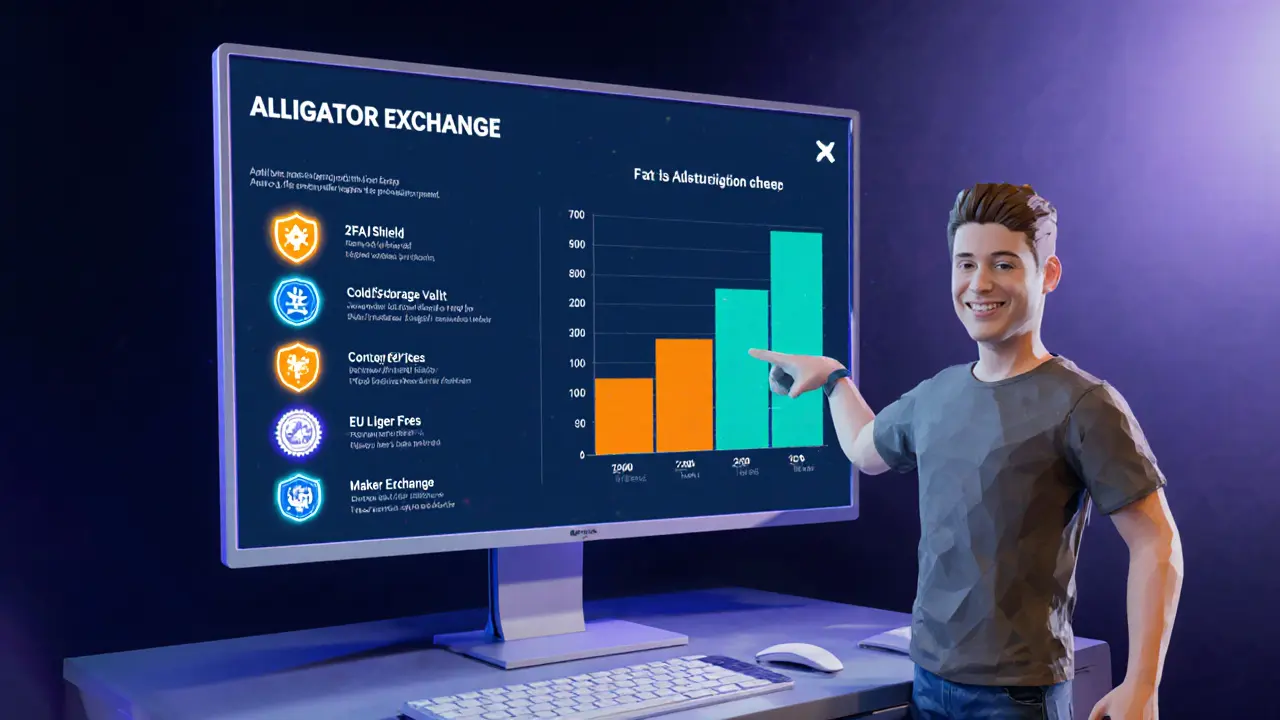Alligator Crypto Exchange Review 2025 - Security, Fees & Features
 Sep, 5 2025
Sep, 5 2025
Alligator Crypto Exchange Fee Calculator
Fee Calculation Parameters
Enter your trading details to estimate fees on Alligator exchange.
Estimated Trading Fees
Trade Amount: $0.00
Order Type: Maker
Volume Discount: None
Fee Rate: 0.15%
Estimated Fee: $0.00
When you hear the name Alligator crypto exchange, the first question is usually: "Is it safe enough for my money?" The crypto world has seen a wave of new platforms in the last couple of years, and Alligator is one of the latest to claim a bite on the market. In this review we’ll break down what Alligator actually offers, how its security stacks up, what you’ll pay for trades, and whether it deserves a spot in your portfolio.
Key Takeaways
- Alligator launched in early 2024 and targets both beginners and seasoned traders.
- It provides standard security tools-2FA, cold‑storage, regular audits-but lacks third‑party insurance.
- Trading fees start at 0.15% for makers and 0.20% for takers; withdrawals range from $2 to $5 depending on the asset.
- Liquidity is solid on major pairs (BTC/USDT, ETH/USDT) but thinner on altcoins.
- Overall, Alligator is a decent entry‑level exchange if you’re comfortable doing your own due diligence.
What Is Alligator Crypto Exchange?
Alligator is a digital asset trading platform that launched in early 2024, positioning itself as a user‑friendly gateway for crypto newcomers while still offering advanced tools for professionals. The exchange operates a web portal and mobile apps for iOS and Android, supporting spot trading of over 150 cryptocurrencies.
Because Alligator is relatively new, public data is limited. The company’s website lists headquarters in a European jurisdiction and notes compliance with the latest AML/KYC regulations. No formal audit reports are publicly downloadable yet, which is something to watch as the platform matures.
Core Features and Trading Options
Alligator’s feature set mirrors that of established players, with a few quirks that aim to set it apart:
- Spot trading for major pairs (BTC, ETH, USDT, BNB) and a growing list of altcoins.
- Basic limit and market orders; stop‑limit orders are available on the web UI only.
- Real‑time charts powered by TradingView widgets.
- Margin trading is not offered yet, keeping the platform simple for beginners.
- Staking options for select proof‑of‑stake tokens, with APY ranging from 4% to 12%.
- API access for bots, though rate limits are stricter than on larger exchanges.
Security Measures - The Checklist You Need
Before you deposit a single satoshi, check that an exchange meets industry‑standard safeguards. Here’s how Alligator measures up:
- Multi‑factor authentication (MFA): Supports SMS and authenticator‑app 2FA. Biometric login is available on the mobile app.
- Cold storage: Claims that 95% of user funds sit in offline vaults, a typical ratio for reputable exchanges.
- Regulatory compliance: Operates under EU‑based e‑money licence, follows AML/KYC procedures, and reports suspicious activity to authorities.
- Regular security audits: Public statements mention quarterly penetration testing by an external firm, though detailed reports are not published.
- Encryption protocols: All data in transit uses TLS 1.3; passwords are hashed with Argon2.
- Session management: Automatic logout after 15 minutes of inactivity, plus device‑based login alerts.
If any of these items are missing or unclear, treat the exchange with caution. So far, Alligator ticks most of the boxes, but the lack of a publicly audited insurance fund means you’re relying on the platform’s own risk management.

Fee Structure & Liquidity
Fees are a major factor when you’re scaling up from a hobbyist to a serious trader. Alligator uses a maker‑taker model that is fairly transparent:
- Maker fee: 0.15% (discounted to 0.10% for volume > $5million per month).
- Taker fee: 0.20% (drops to 0.12% at the same volume tier).
- Deposit fees: Free for crypto; fiat deposits via bank transfer cost a flat €2.
- Withdrawal fees: Fixed per asset - e.g., BTC $2, ETH $2, USDT $1.50, with a minimum $2 for smaller coins.
Liquidity is strongest on the top five pairs (BTC/USDT, ETH/USDT, BNB/USDT, SOL/USDT, ADA/USDT). Depth charts show spreads under 0.2% for these pairs during normal market conditions. Altcoins below the top 30 can see slippage of 0.5%-1% on larger orders, so expect higher execution risk on niche tokens.
User Experience - Web & Mobile Apps
The Alligator UI embraces a clean, “dashboard‑first” design. The web portal loads in under three seconds on a standard 4G connection, and features:
- Customizable watchlists with real‑time price alerts.
- One‑click order entry; hover‑over tooltips explain each field.
- Dark mode toggle for low‑light trading sessions.
The mobile app mirrors the web experience and adds push notifications for price spikes and security events. Some users report occasional syncing delays of up to 30 seconds during high‑volume periods, but overall performance is comparable to mid‑tier exchanges.
Pros and Cons
- Pros
- Modern UI that’s easy for beginners.
- Competitive maker‑taker fees with volume discounts.
- Strong emphasis on MFA and cold storage.
- EU‑based licensing gives a regulatory safety net.
- Cons
- No public audit reports or insurance fund.
- Limited advanced order types (no futures, options).
- Liquidity thinning on lower‑cap altcoins.
- Customer support response times can stretch beyond 24hours during peak load.
How Alligator Stacks Up Against Industry Benchmarks
| Feature | Alligator | Industry Standard |
|---|---|---|
| 2FA Options | SMS & Authenticator app, biometric on mobile | SMS & Authenticator app (biometrics optional) |
| Cold‑Storage Ratio | 95% of funds offline | 90%-98% offline |
| Regulatory License | EU e‑money licence | Varies - many hold US or EU licences |
| Audit Transparency | Quarterly pen‑tests, reports private | Public audit reports common on top 5 exchanges |
| Maker Fee (Base) | 0.15% | 0.10%-0.20% |
| Taker Fee (Base) | 0.20% | 0.15%-0.25% |
The table shows that Alligator aligns closely with what you’d expect from a mid‑size exchange. Its fees sit comfortably in the middle of the market, and its security posture meets baseline expectations, though it lags behind top‑tier platforms that publish full audit results.
Verdict - Should You Trade on Alligator?
If you’re just getting your feet wet in crypto, Alligator offers a frictionless sign‑up, clear fee schedule, and the essential security layers you need to protect your assets. The platform’s EU licence adds a layer of regulatory confidence that many offshore exchanges lack.
However, if you manage large portfolios, require advanced order types, or prefer exchanges with publicly verified insurance funds, you may want to keep Alligator as a secondary account for smaller trades or test‑driving new tokens.
Bottom line: Alligator is a solid “starter” exchange that punches above its weight on security, but it still has gaps that seasoned traders should monitor.

Frequently Asked Questions
Is Alligator crypto exchange licensed?
Yes. Alligator operates under a European Union e‑money licence, which obliges the platform to follow AML/KYC rules and maintain certain capital reserves.
What security features should I enable?
Activate the authenticator‑app based two‑factor authentication, enable biometric login on mobile, and use a strong, unique password. Consider withdrawing long‑term holdings to a personal hardware wallet.
How do Alligator’s fees compare to Binance?
Alligator’s base maker fee is 0.15% and taker fee 0.20%, which is slightly higher than Binance’s 0.10%/0.10% for high‑volume users but comparable for casual traders. Withdrawal fees are also a bit steeper on Alligator for some coins.
Can I trade on Alligator using an API?
Yes. The platform provides REST and WebSocket APIs with rate limits that are suitable for small‑to‑medium bots. For high‑frequency strategies you may hit tighter limits than on larger exchanges.
Does Alligator offer insurance for deposits?
As of the 2025 update, Alligator does not publish a third‑party insurance policy. Users should rely on the exchange’s internal risk management and consider moving large holdings to personal wallets.


Joel Poncz
September 5, 2025 AT 03:48this exchange looks kinda promising but i need more data.
Kris Roberts
September 5, 2025 AT 20:03When you step into the world of a new platform like Alligator, the first thing that matters is how the vibe feels – does it feel like a safe harbor or a risky tide? The security checklist they provide hits most of the standard marks: 2FA, cold storage, and a EU e‑money licence. That said, the lack of a public insurance policy is a red flag for those who hold large sums. Their fee structure sits comfortably in the middle, 0.15% maker and 0.20% taker, which is decent for newcomers but not as competitive as some giants. Volume discounts at $5 M push the maker fee down to 0.10%, showing they’re trying to attract high‑volume traders. Liquidity on big pairs like BTC/USDT is solid, but you’ll see wider spreads on smaller altcoins, so keep that in mind before making a big move. The UI is clean and loads quickly, which is a plus for those who dislike cluttered dashboards. Mobile app sync delays of up to half a minute can be annoying during volatile periods. Customer support can be slow, sometimes taking more than a day to reply, which might frustrate people needing urgent help. Overall, Alligator feels like a decent entry‑level exchange, especially for those who value a straightforward interface and EU regulation. But seasoned traders might want to keep it as a secondary platform while keeping the bulk of assets in a more audited environment. If you’re just dabbling or testing new tokens, it’s a reasonable choice. For serious portfolio management, the lack of an insurance fund and limited advanced order types are gaps worth noting. In short, it’s a solid starter with some growing pains, and whether it fits you depends on your risk tolerance and trading volume. Keep an eye on their future audits and any insurance updates before committing significant capital.
lalit g
September 6, 2025 AT 12:18Appreciate the thorough rundown. The balance between security basics and the missing public audit is something to watch. For a newcomer, the EU licence does add a layer of trust, but diversifying storage is still wise. The fee tiers look fair, especially if you plan to scale up volume. Liquidity on the main pairs seems sufficient for most day‑trading strategies. Just be mindful of the potential slippage on lower‑cap assets. Staying updated on any future insurance announcements would be prudent.
Gaurav Joshi
September 7, 2025 AT 04:33Security is a fundamental requirement for any exchange a lack of public audit can be perceived as a shortcoming it is important to consider the risk exposure nonetheless the cold storage proportion meets industry norms the presence of an EU licence adds regulatory oversight however the absence of a third‑party insurance policy means users must rely on internal risk management practices.
Kathryn Moore
September 7, 2025 AT 20:48Alligator’s security basics check the box but missing the audit is a notable gap.
Kimberly M
September 8, 2025 AT 13:03Hey folks 😊 just wanted to add that the UI feels really intuitive, especially the watchlist customization. If you’re new, the one‑click order entry can boost confidence. Remember to enable both SMS and authenticator‑app 2FA for extra safety. Also, consider moving long‑term holdings to a hardware wallet after you trade. Happy trading! 🌟
tim nelson
September 9, 2025 AT 05:18Nice points about the UI. The biometric login on mobile is convenient but don’t rely solely on it. Strong, unique passwords are still essential. Also, the 15‑minute auto‑logout adds a layer of protection against idle sessions. Just keep an eye on those occasional sync delays during spikes.
Dale Breithaupt
September 9, 2025 AT 21:33Alligator offers a solid set of core features: spot trading, basic limit and market orders, and staking on select tokens. API access is available but the rate limits are tighter than on larger exchanges, which may affect high‑frequency bots. The fee schedule is transparent, and volume discounts kick in at $5 M, which is decent for growing traders. Overall, it’s a straightforward platform for those who don’t need futures or options.
Rasean Bryant
September 10, 2025 AT 13:48Exactly, the transparency in fees is refreshing. The maker‑taker model is easy to understand, and the discount tier is fair. For beginners, the clean UI and real‑time charts make a big difference. Just remember to enable two‑factor authentication for better security.
Angie Food
September 11, 2025 AT 06:03Honestly this place feels like another copy‑paste of the big guys without any real edge. No insurance, limited altcoins, and support that drags forever. If you’re looking for something with real depth, keep scrolling.
Jonathan Tsilimos
September 11, 2025 AT 22:18Alligator’s fee model aligns with industry benchmarks albeit lacking public audit transparency which may affect risk‑adjusted return calculations. The platform’s compliance with EU e‑money regulations provides a regulatory scaffold, yet the absence of an insurance fund is a non‑trivial exposure vector for custodial assets.
jeffrey najar
September 12, 2025 AT 14:33From a practical standpoint, the exchange’s UI is intuitive and the fee structure reasonable for newcomers. The security features like 2FA and cold storage meet baseline requirements, though I’d advise storing large balances offline. Their staking options are a nice addition for passive income seekers. Overall, it’s a viable platform for entry‑level trading.
Rochelle Gamauf
September 13, 2025 AT 06:48While the interface is user‑friendly, the platform’s omission of a third‑party insurance policy is a glaring omission that cannot be ignored by sophisticated investors.
Jerry Cassandro
September 13, 2025 AT 23:03Good to see the mention of staking. Could you share which tokens currently have the highest APY? Also, any tips on optimizing API usage given the tighter rate limits?
Parker DeWitt
September 14, 2025 AT 15:18Alligator? More like a wannabe, trying to copy Binance's playbook without the heavy‑weight backing. 🇺🇸️ If you care about real security, look elsewhere.
Allie Smith
September 15, 2025 AT 07:33i get ur point but i think the low barrier to entry is actually a plus for many newbies lol
Lexie Ludens
September 15, 2025 AT 23:48Honestly, the whole thing feels like a playground for the uninitiated. The lack of thorough audits and the half‑hearted customer support make it feel like they're cutting corners. If you're serious about your crypto, don't waste time here.
Aaron Casey
September 16, 2025 AT 16:03Valid concerns. From a risk‑management perspective, diversifying across exchanges with proven audit trails reduces systemic exposure. Alligator’s EU licence does add a regulatory layer, but without transparent insurance, custodial risk remains.
Leah Whitney
September 17, 2025 AT 08:18For anyone considering Alligator, start small and test the waters. Enable all security options, keep most of your holdings in a hardware wallet, and use the exchange mainly for liquidity and quick trades.
Reid Priddy
September 18, 2025 AT 00:33Everyone's praising this "new" exchange but they ignore the fact that no one knows who's really behind it. It's a classic set‑up for a rug pull, so stay vigilant.
Shamalama Dee
September 18, 2025 AT 16:48Great discussion! If you decide to use Alligator, remember to regularly review your security settings and consider setting withdrawal limits for added protection.
scott bell
September 19, 2025 AT 09:03Indeed, establishing withdrawal thresholds can act as a safeguard against unauthorized withdrawals. Additionally, monitoring account activity logs for unfamiliar device logins provides an early warning signal. Maintaining a habit of periodic password rotation further reduces exposure. For those with sizable portfolios, a multi‑exchange strategy can mitigate concentration risk.